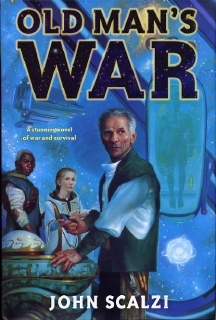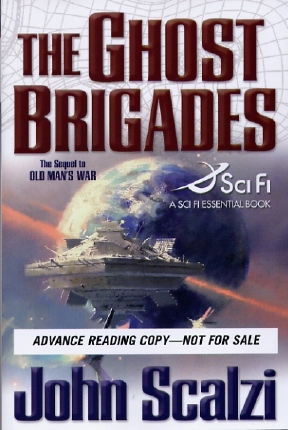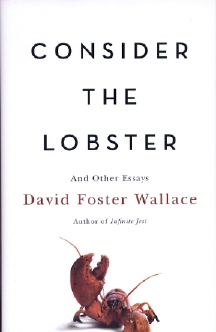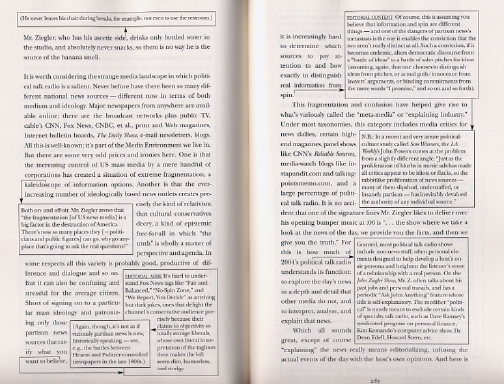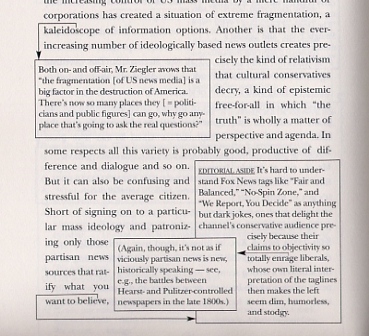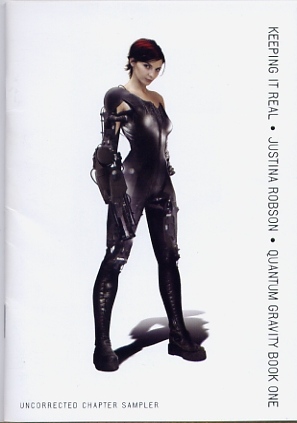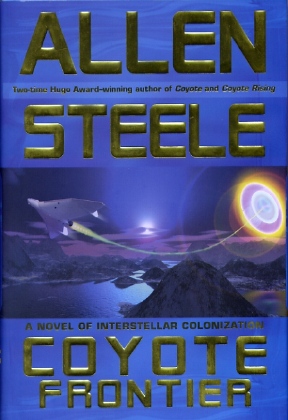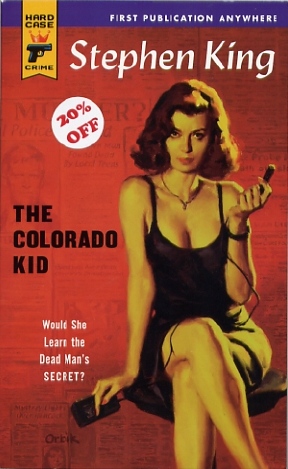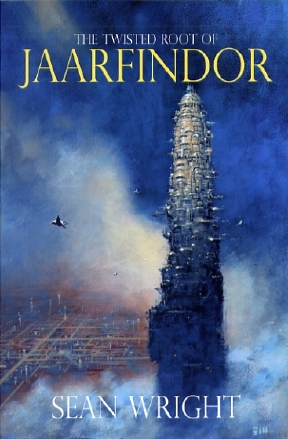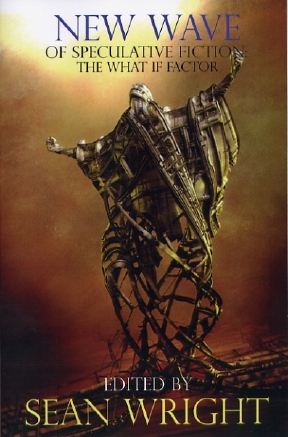|
|
|
This Just In...News from the Agony Column
|
12-09-05: Interview With John Scalzi |
||||||
Ghost
Brigades
JS: Honestly? It was fun. I was very interested to see what sort of reviews it would get, in part because I've been a working critic for 15 years and I wanted to see what life would be like on the other end of the review. I was very happy the book got good reviews, but some of my favorite reviews were the ones that were mixed. Probably the most amusing one I read was from Russell Letson in Locus, in which he describes how he argued with the book all the way through. Perversely, I'm proud of that, because you don't forget a book you argue with. Also, one of the great things about SF reviews is that they tend to be long and considered pieces, so you get to live with the reviewer living with your book. So from the critical side of things, it was a hoot. It was more interesting seeing the non-reviewer response, however. One of the things that is true about the age in which we live in is that thanks to the Internet you can find out pretty quickly what the people who actually shelled out for your book thought of it. Writers have always like to talk about the "dialogue" they have with their audience but these days it's not just some head-patting thing writers say; your readers actually do engage you in a dialogue -- they come right up to the door, bang on it and tell you what they think of you and your book. I think this is kind of cool, and I also think it matters. Reviews are great for Tor's publicity department and my ego, but it's readers liking your book and sharing that enthusiasm with friends that gives you a career. TAC: Shortly after the publication of 'Old Man's War', Subterranean Press bought 'Agent to the Stars'. How did that deal come about, given that it was available online? JS: It came about rather simply: Subterranean publisher Bill Schafer sent me an e-mail that said "I'm reading Agent and I really like it, and I was wondering if I could publish it," and I responded by saying "only if I can keep it online." Agent is my "free sample," the work I have out there to let people see if what and how I write is going to work for them. Bill was not only willing to do that, he was enthusiastic about it; his thinking was that people who really liked the story would want to own a physical copy. Basically, the online version would be an advertisement for the actual book. It's done well for Bill, or so he tells me, so it was a good gamble on his part. And of course, I'm very happy to see it in book form; it was the first novel I wrote, so I have a sentimental attachment to it. TAC: 'The Ghost Brigades' delves into parts of the universe of 'Old Man's War' that we heard about but didn't see directly. JS: Yes, and it was a pain in the ass to do it. When I was writing "Old Man's War" it was easy enough to describe the Special Forces as child warriors in adult bodies; the focus was on the regular GIs so I could just sketch the lives of the Special Forces soldiers. In this book I had to make the setup I had sketched in OMW come to life and actually make sense. I think I pulled it off, but I'm living proof that half the battle of writing a sequel is finding ways to walk around the land mines you laid for yourself in the previous book. The good news is that if you get through the minefield intact, your universe is pretty logically ironclad. The other thing I was able to do in "Ghost" was to fill in some of the background of the Colonial Union. For example, one of the criticisms Old Man's War received was that for a book that took place at least a couple centuries in the future, life on Earth seemed to be trapped in an early 21st century bubble; also people wondered why only folks from the US and other "first world" countries were recruited for the Colonial Defense Forces. I go into that a bit, which was fun to do. TAC: Tell us about the unusual typographical style you developed for the conversations in 'The Ghost Brigades'. JS: As noted in "Old Man's War," members of the Special Forces rarely speak -- they communicate through computers in their heads called "BrainPals." Well, this presented a typographical issue: Normal speech is described by quotes, and people's thoughts by italics, but Special Forces speech is neither, and sometimes a character will perform all three in a single page. There are lots of ways to make that third distinction, but as so much speech is performed this way, it has be something was both easy to typeset and also wouldn't be so alien to readers that it clogged up their reading experience. The solution was to use a double colon in the place of quote marks, so -- ::This would be how you would know they're using Special Forces speech.:: It's distinctive enough that there's no confusion, but it's also not too distracting (hopefully). TAC: This new novel is part of a cross promotion between Tor and the SciFi channel. What exactly is the SciFi channel doing?
TAC: Will we see any more of John Perry? JS: Yes; people want to see more of him and I like the idea of finding out what he's doing next myself. Immediately, people can see him in "Questions for a Soldier," a short story chapbook from Subterranean Press (featuring really excellent illustration from Bob Eggleton), in which he talks to colonists about his experiences as a soldier, which includes a couple of adventures not discussed in the book, including one I had wanted to write for OMW but couldn't manage to fit in. It's like a "deleted scenes" feature for Old Man's War. TAC: Will we see more of this universe? JS: Yes again; I've agreed to write a third book in the Universe, which will be called The Last Colony, and which (as the title suggests) focuses on the colonists in this universe. It will also feature John Perry as well as other characters from the first two books, along with new characters. Like each of the first two books, I'll be trying to write it as "stand alone" as possible, which means that you'll be able to pick up any book in the series and read it independent of the other two. If you read all three, of course, you'll have a fuller experience, but I don't want people to feel like they can't read one of the series just because they can't find the others. TAC: What will we see next from you? JS: Well, let's see. Currently, and in non-fiction, I have "The Rough Guide to Sci-Fi Movies" out; it's a quick and snappy history of science fiction film, from 1902 through this last summer. After "The Ghost Brigades" I'll have another non-fiction book out: A collection of essays from my personal site, "The Whatever," which will be published by Subterranean in June or July. Then in November comes another novel, "The Android's Dream," which despite the title has almost nothing to do with Philip K. Dick. Oh! And in March/April I'm guest-editing an issue of Subterranean Magazine. It's the "Big Honkin' Science Fiction Cliche" issue, where we turned writers loose on some of the oldest SF cliches out there. The line-up includes Allen Steele, Elizabeth Bear, Jo Walton and Scott Westerfeld. It's going to be a lot of fun. TAC: What else should we be reading? JS: Stuff I've been enjoying recently: Scott Westerfeld's Peeps is YA but still fun for grownups; Cherie Priest's Four & Twenty Blackbirds has a delicious spooky vibe; I'm still high on Charlie Stross' Accelerando (and his Jennifer Morgue is a lot of fun, too) and I'm currently in the process of reading Elizabeth Bear's Worldwired. Books I'm looking forward to: Toby Buckell's Crystal Rain, Justine Larbalestier's Magic Lessons, and Nick Sagan's Everfree. TAC: How does the blog world affect your writing? JS: As in, my science fiction writing? Not at all. They're two separate writing muscles. As in, my science fiction writing *career*? It affects it in a highly significant manner. Not only does my site make it easy for readers to find me between books, the blog world in general has been very supportive of my books so far, and it's had a measurable impact. Early in the lifespan of Old Man's War, Glenn Reynolds of Instapundit said nice things about the book, and the Amazon rankings shot from the six figure range to the three figure range in just a couple of hours, thereby making him my hero. I would estimate up to half my sales have come from people recommending the book in their blogs. And I could just kiss them all. TAC: Any final words? JS: If you use a graham cracker crust for a pecan pie, the filling carmelizes against the crust and makes it delightfully chewy, like candy. Try it sometime. |
|
12-08-05: David Foster Wallace 'Consider the Lobster' |
||||||||
Daggers,
Stars and De-Bowdlerization
Or you think, "Oh man, I loved that book." After all, weren't we just talking last week about Frederic Jameson's 'Archaeologies of the Future'? Now you know, you KNOW that Jameson's GOT TO mention Wallace's magnum opus. And it does get two sentences in the final section of the book, titled "Fear and Loathing in Globalization", which I shall reproduce here for your reading pleasure: "This new geopolitical material marks a significant historical difference between such commercial adventure stories and the equally cynical gonzo journalism of an older period (indeed the affinities and distinctions between the cultural products of the 1960s and 1970s and those of the 1990s and 2000s would be well worth exploring further). Equally significant is that these protagonists -- busy as they are locating rare products, securing secret new inventions, outsmarting rivals and trading with the natives -- do not particularly need the stimulus of drugs (still a preponderant, one may even say metaphysical presence in so recent a world-historical expression as David Foster Wallace's Infinite Jest, of 1996.)" And in another example of why I liked that book so much, this paragraph is embedded in an essay on William Gibson's 'Pattern Recognition'. Just so you have some context. And an idea why David Foster Wallace is a natural subject of this most difficult column. And finally, as to why you might want to consider 'Consider the Lobster' (Little, Brown / Time Warner Book Group ; December 13, 2005 ; $25.95) for purchase. Yes, I know you're thinking about 'Lobsters' by Charles Stross, the launch point for his 'Accelerando' sequence, and wondering, thinking, hoping that Wallace is going to discuss the viability of using lobster brains to drive things in space. No such luck, alas. What Wallace is up to in these essays, however, is no less entertaining. And in fact, Wallace has more than a bit to share with Jameson, in that, unless you saw an author photo, you might imagine both as looking like something out of a science fiction movie; huge-brained, with exposed lobes throbbing in a florescent-green liquid bath.
The author photo on the dust jacket of 'Consider the Lobster' subverts that ideation†. († See what happens when you read Foster? You use words like "ideation." It's an occupational hazard of the job that I do so you dont have to.) Nope, Foster looks more like a rock star. But he writes like, like...a really, really smart and interesting guy with a wicked-dark sense of humor. Who loves footnotes. So first and foremost, if footnotes give you hives, then you might want to give this book a pass. But if you're reading this column, and you've made it this far, then I'm guessing that footnotes dont give you hives. In fact, the presence of footnotes is probably a plus for readers of this column. We've rhapsodized about footnotes in fiction, and even published a short story by Susanna Clarke from 'Jonathan Strange and Mr Norrell' that was a footnote in the novel. The bottom line: we're totally on-board with Wallace's new collection of essays. But before we get to specifics on the subjects, let's talk bowdlerizing. According to my in-program dictionary (neither complete nor reliable, like the software itself) "bowdlerize" means: "To remove parts of a work of literature that are considered indecent." As I am wont to do when confronted with an obvious collection of previously published pieces, I made a point of checking the colophon page. (What is it about Wallace that brings out your inner thesaurus, huh?) Above the previous publication credits, readers will have their first encounter with the author's voice. It's encouraging. "The following pieces were originally published in edited, heavily edited, or (in at least one instance) bowdlerized form in the following books and periodicals." Okey dokey, I'm hooked! But wait -- we havent even hit page one yet, -- and there's more! Wallace offers up a note bene (N. B.), again (hitting the dictionary with Wallace's work is probably required) "used to draw someone's attention to something particularly important, usually an addition to or qualification of a previous statement." Now we come to the stars and daggers. Stars (asterisks, he calls them, big word fella that he is), are used to mark pieces written for "a particular organ" [one wants to think its the brain, but actually he's referring to the magazine] where the name of the magazine keeps popping up in the article in a way that "can't be changed without screwing up the whole piece." This is a very nice way of saying, "Please dont get annoyed by the screamingly obvious fact that this is a collection of previously published pieces." Not me! Not annoyed at all, Mr. Wallace. Carry on, and do explain the daggers. "A single case in which the essay was written to be delivered as a speech, plus another one where the entire article was written bipseudonymously and now for odd and hard-to-explain reasons doesn't quite work if the "we" and "your correspondents" thing gets singularized, are further tagged with what I think are called daggers." "What I think"? Oh come on, you so KNOW they are called daggers. Dont get all "bipseudonymous" on me and then say you dont know what one of these: † (Time character 160, Unicode 8224) is called. Don't make me get my thesaurus out, Wallace! What I think is that only two of the ten essays are unmarked. That must mean something. Now, you could approach Wallace's work as if it were some sort of academic Holy Grail. You'd get out the dictionary, sit down at your computer with Google to hand, then open up the book and read it carefully, respectfully. You'd take notes, and make sure you parsed every goddamned sentence. Youd read and -reread. You might write an essay or two, perhaps bathe the pulsing lobes of your brain in a glowing green salve. I suggest you eschew this approach. Leave it to people even more professional than I. And as I'm not getting a paid a single sovereign (oh my brain is expanding, MAKE IT STOP) for this article, I'd probably not be considered particularly professional.
And if any writer can make me want to get drunk and hang out of a frat house window with a footnote to a footnote after reading about how Kafka is funny, that writer is MY KIND OF WRITER. I mean, really. And I'm wondering if Harper's, where this piece was originally published, bowdlerized the word "fuck" right the fuck out of that footnote. There'll be no such bowdlerizing going on here, I can assure you! OK, on to some specifics. There's an essay called "Big Red Son" (*†) about the adult video awards, and it is in no way a coincidence that E-Bay is this day advertising an ENTIRE PORN COMPANY for sale for the ridiculously low price of $100,000. (Warning, link may exxpire, check it out NOW!) Come on, David, you can fess up. There's a piece of writing called "Host" (*at least a tiny bit) [even his asterisks have footnotes!] that involves some of the most complex typography I've seen since I last opened 'House of Leaves'. I mean, what, the guy writes this stuff in Quark? It's about a visit to a right-wing talk-show host in LA. John Ziegler on KFI, in case you were wondering. I think that's the case, unless I followed an arrow in the wrong direction. This is a book to read quickly, probably while you're on your way to "falling-down drunk.' This is a book to read in restaurants while you sip wine and madly cackle. This is a book to open up when someone you know is serving lobsters, because you'll find some entertaining "do they feel pain" speculations in the title essay. This is a book to buy because your brain has left the confines of your skull, and is even now being bathed in a florescent green liquid. |
|
12-07-05: Justina Robson is 'Keeping It Real' |
|||
Elves,
Selves and Metal
Oh. Yeah. Of course, and that. Well, now theyve got one other thing in common; Justina Robson. That is, on the back of the 32-page sample pamphlet from Justina Robson's forthcoming 'Keeping It Real: Quantum Gravity Book One' (Orion Books ; May 18, 2006 ; £17.99 / £10.99), we're told that Robson's new book is, "Perfect for fans of Laurell K. Hamilton and Peter F. Hamilton alike!" And "quantum gravity" is what keeps women with those Lara-Croft-like proportions from tipping over. All kidding aside, Peter F. seems to have bypassed his 'Misspent Youth' and re-grown up with his recent novels, 'Pandora's Star' and 'Judas Unchained'. Laurell K., on the other hand, seems to have veered off permanently into some sort of psycho-sexual netherworld from which she's not yet returned. If that sort of thing is your cuppa, then, there's no better vendor. I just yearn for the might-have-been series of hardboiled supernatural detective stories. But besides elves cast into a modern/futuristic setting, Robson's 'Keeping It Real' has little in common with Laurell K. And besides a modern/futuristic setting, Robson's 'Keeping It Real' has little in common with Peter F. And that's all for the better. In the 32 pages I read, 'Keeping It Real' declared itself to be a futuristic detective story in which the main character, Lila Black, uncomfortable with elves, finds herself assigned to be a bodyguard for an elf rock star. I can see why Orion would want to publish a pamphlet for it, declare it a series and promote the heck out of it. 'Keeping It Real' is totally engaging, easily read and just thought provoking enough to remind you that the organ youre using to read it is in fact your brain. Lila, you see, has been remade a bit, so that there's more metal in her than there is in most folks, even those with a tin hip. And she's not just a bodyguard. Her assignment to watch over that strange fish Zal (the elven rock star) has more to do with national security than music appreciation. Robson's elves, faeries and whatnot are just wonderfully, wonderfully done. She treats them not so much as supernatural critters but more like, well, legal aliens. Sure they've got some mojo happening, but so has Lila. Zal's may be an aura and Lila's may be nanotech, but in practice it all boils down to an ability that lends one more advantages than disadvantages. Robson has a knack for combining grit and wit that can't be beat, and in the brief space allowed, she manages to totally immerse you in her world and her characters. Between 'Keeping It Real: Quantum Gravity Book One' and 'Living Next Door to the God of Love' is a huge space. They're utterly different except in one aspect: they're both utterly excellent. Robson has showed herself to be one of our most versatile, vital writers. From the textured mystery of 'Silver Screen' to the slick thriller of 'Mappa Mundi', to the surreal, sublimely silly space opera of 'Natural History' to the inner/outer spaces of 'Living next Door to the God of Love', we've seen one smart, imaginative book after another. Yes, Justina Robson has a penchant for writing great books. And that's not at all embarrassing. |
|
12-06-05: Allen Steele Explores 'Coyote Frontier' |
|||
Human
Baggage Check
At least it does for the European Alliance, bringing with them the fruits of human invention. In this case, that proves to be a Star Bridge, a bit of irony that the EA is entirely unaware of. Perhaps they missed the cover of the last novel, wherein our heroes blew up a very important bridge to save themselves from their saviors from Earth, in that case, the "Western Alliance." With a revolution behind them and independence from Earth, the colonists are running to the end of their resources. Everything they brought with them is old, broken or in-between those two states. Large portions of the planet remain unexplored, and the survival of the colony is uncertain. In theory they'd be glad to see the EA and the Starbridge, which permits almost instantaneous travel between Earth and Coyote. But the EA isnt on Coyote to turn things around for the colonists. While the revolution on Coyote passed and stuff got old, the folks on Earth continued to trash our planet. The EA doesn't just want to help. It wants to move in. Once again, Steele has crafted a clever political satire as well as an engaging and imaginative adventure. Rough-and-tumble colonists have to outsmart incoming would-be exploiters of the environment. With nothing but their wits can they accept the fruits of the Starbridge and keep themselves to themselves and for themselves? One presumes that's the case, but Steele is clearly not an optimist. Or if he is -- and the folks on Coyote might suggest this -- his optimism is tempered with real-world expectations of how humans behave. Generally, it's quite badly and selfishly, unless theyre backed into a corner where altruistic behavior is the best method of survival. A large part of the backdrop of Steele's new novel involves the fallout of global climate change and the political repercussions. This is a timely subject for science fiction, which like environmental science, involves quite a bit of extrapolation. And Steele has entered into a conversation that currently includes authors as great as Kim Stanley Robinson and as well known as Michael Crichton. But like lots of science fiction, the real innovations here aren't so much technological as political and moral. The question is not "What keen bit of technology is going to pull our keester from the fire?" The question is, "Will we be able to change our societal behaviors so that we dont muck it all up a second time?" Given that we've done and continue to do a fine job of mucking it up the first time around, I wouldnt be optimistic that we'd be better off given a new start in the sort of Edenic environment that Coyote seems to offer. Well, Edenic compared to...some parts of Earth in the here-and-now. I asked Steele about the Coyote trilogy, and the science and politics behind these books. He told me: "COYOTE FRONTIER is, indeed, the end of the trilogy. The narrative arc that began with COYOTE and continued with COYOTE RISING reaches its end. Although I'll continue to write individual stories set on Coyote -- there's one on Amazon Shorts, "The War of Dogs and Boids", and another, "Walking Star," that will appear next year in an anthology edited by Marvin Kaye -- these are stand-alone pieces, and further stories, if and when written, will probably be the same. "I may eventually write another Coyote novel, but not for some time. However, the novel I'm currently writing is set in the same universe, and uses the events of COYOTE FRONTIER as its kick-off point -- sort of like, "Meanwhile, in another part of the galaxy..." -- so obviously I'm not quite done here yet. "COYOTE FRONTIER is rather topical, yes, and quite deliberately so. There's a lot here that deals with the long-term effects of global climate change, and much of the politics is a reflection of those in our own time. I think that this is something that science fiction has the potential to do: examine our present circumstances through the lens of the imagination, in a way that contemporary fiction cannot do." So, no, we wont be getting 'Abbot and Costello Go to Coyote', although, I have to say, that I'd probably be up for that one. I'd give 'God Emperor of Coyote' a pass, but 'Abbot and Costello'? Hmm. Or 'Wile E. Coyote on Coyote'? Or 'Roadrunning to Coyote'? I like the sound of that. And think of the possibilities of the Starbridge. You could fall into a whole new universe. And that, of course, is the point of much science fiction. |
|
12-05-05: Crowswing Books from Sean Wright; Hardcase Crime and Stephen King |
||||||||
Paperback Monday
If you actually go to the bookstore -- and you should go to physical bookstores, both in and out of chains -- you'd be hard pressed to miss Stephen King's 'The Colorado Kid' (Hard Case Crime ; October 4, 2005 ; $5.99). I generally enjoy King's work, and I'm certainly more predisposed to enjoy this one than most. King has handed off a nice, taut toe-tapping tale of terror to Hard Case, probably the lightest-weight 800 pound gorilla that has ever slipped in the door; not to tear the place apart, but to simply sit down and chew on leaves and vegetables. But between the eye-catching cover design that the guys over at Hard Case have coined and the unmissable King name, well, it's a hell of a catch for this small press. And at a 178 pages, it's probably the shortest Stephen King novel you're going to see this side of the millennium. And finally, given a cover price of $5.99 and that 20% OFF sticker, which is likely to pop up wherever, as they say, fine books are sold, heck, it comes in at $5.17. That's a bargain even for a lightweight noir novel about two old geezers and the hot-cha babe on the cover. While the back cover might try to drop a couple of clues that this is a typical (that is supernatural) Stephen King novel, I dont believe that this is the case. Still, it's the kind of book that will certainly serve to pass the time in front of the fire on the chilly winter evening. Not every damn thing you read has to be a masterpiece. Besides, I like books about old geezers. Moreover, you may find yourself looking back on that evening with a certain fondness. Sometimes the books you dont think much about return to haunt your memories. And even books that aren't about the supernatural may themselves serve a supernatural purpose in your life. Probably the biggest and best deal about this book, however, is all the advertising for the rest of the Hard Case Line you'll find within. Now that's certain to bring attention to a lot of fine authors. You'll find titles by Lawrence Block, Donald Westlake and even Earl Stanley Gardner. There was a time in my life when I watched the old black and white episodes of Perry Mason with rapt attention. We were living in Garden Grove, and our boys were just tiny babies, but those babies were imprinted with the grainy, shadowy images of Raymond Burr and company, single-handedly inventing the Flawed & Sordid genre. Back in the real world, Hard Case is moving forward with the times. Already available is 'The Confession' by Dominic Stansberry, author of 'Chasing the Dragon'. Forthcoming titles will include 'Bust', a very intriguing collaboration between Ken Bruen ('The Guards' and 'The Killing of the Tinkers') and Jason Starr ('Twisted City'). And that cover design! To die for, several times over. Takes me right back to my even more youthful youth, when, as a pre-teen, I discovered Mickey Spillane paperbacks in the bookshelves on a houseboat where we spent our summer vacations. Between the Spillane and the copies of Mad Magazine, I was ruined for life. The message is very clear. If you've not already discovered Hard Case, check out their website, and order their books directly. Come in for the Stephen King, but stay for the fine taste and strong vision that drew King's eye in the first place.
Well, not quite. Yes, different genre, different writers, different cover style. But the same strengths, nonetheless. The Crowswing titles are trade paperback format instead of the mass-market cheapies. But they have great cover illustrations. 'The Twisted Root of Jarfindor' sports the work of Les Edwards, AKA Edward Miller, Edward Millar and the gent who is already finished doing the illustrations for the Night Shade Deluxe edition of China Miéville's 'Perdido Street Station'. Readers know that he's one of my favorites. 'New Wave' features the work of Richard Marchand, whose work has recently graced the cover of 'Interzone'. Moreover, at 150 pages ('Jarfindor') and 196 pages ('New Wave'), neither of these books is going to break the bank in terms of the time it will take you to read them either. Hell, between the three of them, you'll barely spend a week of winter in front of the fire. 'Jarfindor' is something of a spin-off from Wright's apparently-quite-successful Jesse Jameson series for children. 'Jarfindor' is not Jesse Jameson, however; it's for the (and here I quote) 'Teen-adult crossover market'. Read: bazillions of Harry Potter fans. You've got your 18-year old addict who just happens to be a princess, and she's on the prowl for the titular tantalizing tangle. She's hired a protector, a gangly, mute stranger. Gee, do you think they might have a conversation? But let me tell you this. 'Jarfindor' is a lovely little book, beautifully printed, nicely designed and really cheap. I get a sort of Jack Vance vibe from this one, and with only 150 pages, big print, and white-white pages, it seems the type of book that you might successfully hand off to the video-game-addict in your house when they plead for a book to read for English class. And if you've already run through it yourself, you'll be able to spot-check 'em -- and have enjoyed a nice tight tale of fantasy adventure in the process. 'New Wave' offers something a bit more serious. There are thirteen stories here, including a BFS finalist, 'Fen Shui' by Andrew Hook. Some of the authors' names will be familiar; Lisa Dumond is a mainstay of Sfsite, Paul Finch won accolades for 'Aftershocks'; and others will be less familiar. But the idea of an all-original trade paperback anthology of new SF stories is solid, respectable and always welcome. To my mind, you really can't lose with something like this, and my shelves are filled with these sort of books. I've discovered many of my favorite authors in these sorts of anthologies; it was in a paperback anthology titled 'Dark Fantasies' edited by Chris Morgan where I first encountered Brian Stableford and a host of writers who went on to become staples of my reading. Who can say what we'll be reading five years hence? Or what we'll remember? Look, three books, two publishers. Say, twenty bucks. Not a bad haul. Cozy up to the fire. Here's a pile of paperbacks. Enjoy. |
